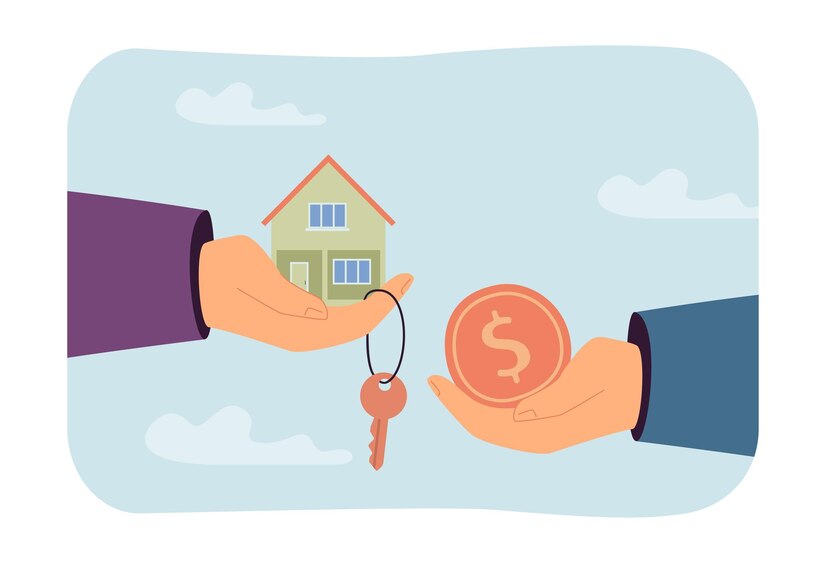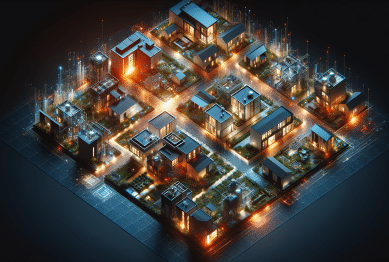The age-old question of whether to rent or buy a home has become even more relevant in 2024 as the real estate market faces new challenges and opportunities. Rising interest rates, changing economic conditions, and evolving buyer preferences are reshaping the housing landscape. With so many variables to consider, it’s essential to evaluate the financial, lifestyle, and market factors that influence your decision. In this guide, we’ll explore renting vs. buying in 2024, weighing the pros and cons to help you make an informed choice that aligns with your personal and financial goals.

1. Current Housing Market Trends in 2024
Before diving into the rent vs. buy debate, it’s crucial to understand the current state of the housing market. The real estate market in 2024 is marked by fluctuating interest rates, high home prices in certain regions, and a continued demand for rental properties.
Key Market Trends
- Rising Interest Rates: Mortgage rates have increased significantly compared to previous years, making homeownership less affordable for some buyers.
- Stagnant Property Prices: While home prices in high-demand areas remain high, some regions are seeing a stabilization or slight decline in prices.
- Increased Rental Demand: As potential buyers hold off due to high interest rates, the demand for rental properties continues to rise, leading to increased rental prices.
Why It Matters
Understanding these trends will help you determine whether renting or buying is the better option based on your local market conditions and financial situation.
Pro Tip
Use online tools like Zillow and Redfin to research local market trends, including average rental prices and home values.
2. The Financial Breakdown: Comparing Costs of Renting vs. Buying
One of the biggest considerations when choosing between renting and buying is the financial impact. Both options come with unique costs that can vary significantly depending on your location and lifestyle.
Costs of Renting
- Monthly Rent: The primary expense, which can fluctuate based on location, property size, and amenities.
- Security Deposit: Typically one to two months’ rent, refundable if no damage occurs.
- Additional Costs: Utilities, renter’s insurance, and sometimes maintenance fees.
Costs of Buying
- Mortgage Payments: Monthly payments, which include principal and interest, can vary based on loan terms and interest rates.
- Property Taxes and Insurance: Ongoing expenses that must be factored into the total cost of homeownership.
- Maintenance and Repairs: As a homeowner, you’re responsible for all upkeep and unexpected repairs.
Why It Matters
A study by the Urban Institute (2023) found that the average monthly cost of homeownership, including mortgage, taxes, and maintenance, is 20% higher than renting in many U.S. cities.
Pro Tip
Use a rent vs. buy calculator to estimate your monthly costs and see which option is more financially viable for you.
3. Pros and Cons of Renting
Renting offers flexibility and lower upfront costs, but it also comes with limitations in terms of control and long-term investment.
Benefits of Renting
- Flexibility: Easier to move and change locations without the hassle of selling a property.
- Lower Upfront Costs: Renting typically requires just a security deposit and first month’s rent.
- No Maintenance Worries: Major repairs are the landlord’s responsibility, saving renters time and money.
Drawbacks of Renting
- No Equity Building: Monthly rent payments don’t contribute to building any financial asset.
- Rent Increases: Rent prices can rise with market demand, making budgeting more challenging.
- Limited Customization: Restrictions on making changes to the property’s interior or exterior.
Why It Matters
A report by RentCafe (2024) shows that rent prices increased by an average of 8% nationwide last year, making it a potentially less predictable option in the long term.
Pro Tip
If you value flexibility and are unsure of your long-term plans, renting might be a better choice.
4. Pros and Cons of Buying
Homeownership is often seen as a long-term investment, but it comes with higher upfront costs and long-term commitments.
Benefits of Buying
- Building Equity: Each mortgage payment builds equity, increasing your financial stake in the property.
- Stability and Control: Fixed mortgage payments offer predictability, and you have the freedom to customize your space.
- Tax Benefits: Homeowners may qualify for mortgage interest and property tax deductions.
Drawbacks of Buying
- High Upfront Costs: Down payment, closing costs, and other fees can add up to tens of thousands of dollars.
- Maintenance and Repairs: You’re responsible for all upkeep, which can be costly and time-consuming.
- Market Risk: Home values can fluctuate, and there’s no guarantee of a return on your investment.
Why It Matters
A 2024 study by the National Association of Realtors (NAR) found that the average homebuyer spends an additional 1-4% of their home’s value annually on maintenance and unexpected repairs.
Pro Tip
If you plan to stay in one place for 5-7 years and want to build long-term equity, buying could be a worthwhile investment.
5. Lifestyle Considerations: Which Option Fits Your Life Goals?
Your decision should align not only with your financial situation but also with your lifestyle and personal goals.
Renting Might Be Better If:
- You prefer flexibility and the ability to move frequently.
- You’re unsure of your long-term plans or career stability.
- You want to avoid the responsibilities of home maintenance.
Buying Might Be Better If:
- You’re ready to settle in one location for an extended period.
- You’re looking to build equity and have control over your living space.
- You’re prepared for the financial commitment of owning and maintaining a home.
Pro Tip
Ask yourself where you see yourself in the next 5-10 years. If your plans are uncertain, renting might be the safer option.
6. How to Decide: Key Questions to Ask Yourself
To make an informed decision, consider asking yourself the following questions:
- What Are My Financial Goals? Do you want to build equity or maintain flexibility with lower upfront costs?
- What’s My Current Financial Situation? Can you afford a down payment, closing costs, and ongoing maintenance?
- Where Do I See Myself in 5 Years? Do you want to settle down, or is flexibility a priority?
- What Are the Market Conditions? Is your local market favorable for buying, or are rent prices more affordable?
Pro Tip
Consult a financial advisor or real estate expert to evaluate your specific situation and get personalized advice.
Final Thoughts
Deciding on Rent vs. Buy in 2024 depends on financial factors, lifestyle preferences, and market conditions. Renting offers flexibility and lower upfront costs, while buying allows you to build equity and gain long-term stability. Evaluate your personal goals, current housing market trends, and financial situation before making a Rent vs. Buy decision. Whichever path you choose, understanding the pros and cons will help ensure the best choice for your future.
References
- Urban Institute. (2023). The Cost of Renting vs. Buying in Major U.S. Cities. Available at: www.urban.org.
- RentCafe. (2024). National Rent Trends and Projections. Available at: www.rentcafe.com.
- National Association of Realtors (NAR). (2024). Annual Homebuyer Report. Available at: www.nar.realtor.









